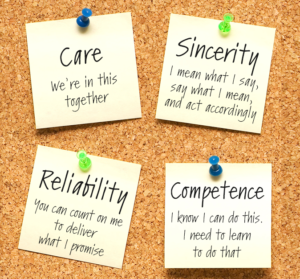We often reflect on what makes the biggest difference in our roles. The ability to manage email? A Masters or PhD? An eye always for efficiency? So often though we have learned that more than anything, it is trust that makes or breaks our ability to be effective in our academic work.
Whether it’s the trust of, or in your administration, your students, your colleagues, your collaborators, or your team—trust is at stake and plays out in every conversation, interaction, or perception. With other people, it’s absence can render our supposedly well-intended actions to be met with incredulity, indifference, or hostility.
Trust takes years to build but can vanish in an instant — trust arrives on a snail, but can leave on a horse.
This month’s remarkable resource: The Thin Book of Trust is seldom out of our reach day-to-day. It defines trust as:
“choosing to risk making something you value vulnerable to another person’s actions.”
This definition speaks to what makes for truly supportive workplaces, including psychological safety, relationships, and empathy. Many of us have been through some tough times at work these past two years. In our own roles, we have experienced work place changes and job losses, threats of labour disruption, and numerous stages managing the restrictions and impact of COVID. If there’s one lesson we’ve learned from these most difficult work situations—it’s that trust, like a vine, grows best in difficult places.
It’s when our collective backs are against the wall, the wall feels like its falling down, or is totally overwhelming us, that trust can build best. Not in safety but in vulnerability. Even though we may lose important things in academic work situations—from face, to opportunities, to resources— trust can always grow. This month’s remarkable resource helps teach how you can approach your work with a trust lens, and even in the most difficult circumstances, work towards trust being strengthened.
The Thin Book of Trust: An essential primer for building trust at work (2nd Edition)
by Charles Feltman
There’s few things that get us as excited as a new edition of one of our favourite books. Updated and refreshed, Charles Feltman’s essential book is for anyone who cares and wants to grow trust in work situations, and is a resource we see as simply indispensable. Have it not in your bookcase or bag but at all times on your desk—just a reach away.
Through it, you will understand that building trust is a learnable skill, and know how to best do this.
Key Messages
Trust is composed of four key facets, summarized in the following notions:

Trust is “choosing to risk making something you value vulnerable to another person’s actions”; while distrust is the choice not to make yourself vulnerable to another person’s actions.
When you have unintentionally or intentionally broken another person’s trust, acknowledging and apologizing is key. Learning how to apologize well is a key aspect of your work and yourself, and is essential to building and rebuilding trust.
Key Applications
Broken Trust
Can you think of a work or personal situation where you broke the trust with someone important to you? What was it that was valued by the other person that was at stake?
Built Trust
Can you think of a work situation where someone else really built trust with you? What was it about how they approached what was important to you that made a big difference?
Considering the four facets of trust, what can you do with your colleagues, students, or teams to build trust in a situation you are currently in?
